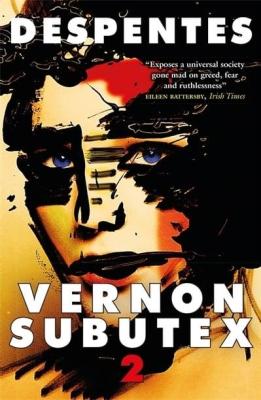Translated by Frank Wynne
Review by Basil Ransome-Davies

Almost two decades ago I saw a French movie called Baise-moi. It contained, besides much simulated violence, what Wikipedia fastidiously calls ‘several unsimulated sex scenes’. Yes, actual fucking and sucking, the two principals being played, necessarily, by porn actresses. Filth at the arthouse? Sort of, along with the organic ice cream. I liked the film a lot. It was a down-and-dirty, nihilo-existential counterblast, comparable to a hybrid of Bonnie & Clyde, Thelma & Louise and a low-budget rape-revenge trash flick, altogether unlike the home life of our own dear queen. It dramatised issues of sex, gender, power relations and art more candidly than mainstream cinema’s coy, hygienic eroticism and helped along the debate.
The co-director of Baise-moi, and author of the novel on which it was based, was Virginie Despentes; in Vernon Subutex Two (which I should admit I come to not having read Vernon Subutex One) down-and-dirty she remains. Her characters have odd, off-colour names – Alex Bleach, Vodka Satana, Lauren Dopalet, The Hyena – and they move, enveloped by complex personal histories, in a subcultural half-world of which the topographical focus is the Parc des Buttes Chaumont, one of Paris’s great recreational ‘lungs’ with its green spaces, belvederes and falling water.
Here, Vernon Subutex resides as a homeless person. He’s far from the only one. Earlier this year charities estimated the homeless population of Paris at 3,000, for all Macron’s election pledge to fix the problem. But Vernon, once a legendary record shop proprietor, is there voluntarily, it seems. His presence, his countercultural c.v., his network of friends and associates, and his pre-eminence as the supposed keeper of the fabulous Alex Bleach tapes mark him out as both an individual and a representative figure who brings the marginals of a repressive though volatile social formation to the centre. These tapes are what might be called the McGuffin of the story, the elusive grail that gets everyone worked up. Do they matter? Not all the characters imagine them to be the vital, creative legacy of a dead genius. And to at least one of them Vernon himself is a false messiah:
The guy was so fucked up he refused to sleep in a bed…. And the chorus of arse-licking comments about him as though these people couldn’t see what he was: a sad bastard who’d gone completely wacko. They wanted to turn him into Rimbaud when he was just a deadbeat loser.
But popular music certainly does matter. One facet of the extraordinary growth of the popular music industry since the 1950s is the adoption of musical taste as an identifier. Certain singers, albums, groups furnish many people with the ‘soundtracks of their lives’. But like many assumptions, the value of this cultural commitment is variable and always subject to the sway of historical forces. Rock ’n’ roll burst into the lives of (mainly male) adolescents with a subversive energy, denounced from the pulpit and frightening parents, but it was as marketable as everything else. Cue the big record corporations and the subsequent culture clash between the ‘authentic’ and ‘the commercial’. Despentes is good on this, letting the judgement of a true believer digest the domestication of ‘rebel’ music into a fashionable commodity:
We entered rock music the way you enter a cathedral…. And before we knew it the dream we held sacred had been turned into a piss factory…. Nothing belonged to us any more…. Rock music was a useful adjunct to the official language of capitalism, the language of marketing slogans, pleasure, individualism, sounds that could manipulate you without your consent. We hadn’t realised that the magic beans in our hands were pure diamonds.
The story is told in relay form, as successive chapters are filtered through the reflecting consciousness, experience and sensations of different characters, an anti-community of lost souls with no single viewpoint. The alienation of modern urban existence, that old thing? Yes, but intelligently and wittily recast for the twenty-first century by a woman who has been in the life. Her style – translated from the French by Frank Wynne) often has a pithy, epigrammatic flavour, uses slang and obscenity offhandedly and displays an imagination unfreaked by the supreme messiness, even the squalor, of human relationships. Devotees of polite, well-bred literature may be repelled. But the author never loses touch with the human, and there are passages of writing where the spark of life is visible through unpropitious circumstances like a diamond in a midden which reminded me of that great celebrant of the fallen and unregenerate, a sterling optimist malgré tout, Samuel Beckett. Vernon Subutext Two concludes with a vision of communal empathy as Vernon ‘fires up Alex’s alpha waves’.
All around the living the dead and the invisible dance, shadows merge and eyes close. All around him, the movement has been triggered. It is beginning. He is making them all dance.
As Becket might put it, ‘Dance first. Think later. It’s the natural order.’

Virginie Despentes, Vernon Subutext Two (Maclehose Press: London, 2018). 978-0-85705-770-9, 334 pp., paperback.
BUY at Blackwell’s via our affiliate link (free UK P&P)

